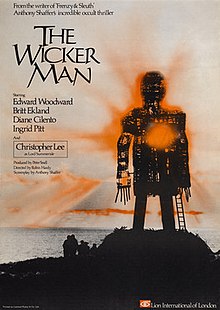
Back The Wicker Man Welsh The Wicker Man (film fra 1973) Danish The Wicker Man (1973) German Το καταραμένο σκιάχτρο Greek The Wicker Man (película de 1973) Spanish The Wicker Man (1973ko filma) Basque مرد حصیری (فیلم ۱۹۷۳) Persian Uhrijuhla Finnish The Wicker Man (film, 1973) French O home de vime Galician
| The Wicker Man | |
|---|---|
 Theatrical release poster | |
| Directed by | Robin Hardy |
| Screenplay by | Anthony Shaffer |
| Produced by | Peter Snell |
| Starring | |
| Cinematography | Harry Waxman |
| Edited by | Eric Boyd-Perkins |
| Music by | Paul Giovanni |
Production company | |
| Distributed by | British Lion Films |
Release date |
|
| Country | United Kingdom |
| Language | English |
| Budget | £471,600[2]–£500,000[3] |
| Box office | $475,661[4] |
The Wicker Man is a 1973 British folk horror film directed by Robin Hardy and starring Edward Woodward, Britt Ekland, Diane Cilento, Ingrid Pitt and Christopher Lee. The screenplay is by Anthony Shaffer, inspired by David Pinner's 1967 novel Ritual, and Paul Giovanni composed the film score.[5][6]
The plot centres on the visit of a police officer, Sergeant Neil Howie, to the isolated Scottish island of Summerisle in search of a missing girl. Howie, a devout Christian, is appalled to find that the inhabitants of the island have abandoned Christianity and now practise a form of Celtic paganism.[7]
The Wicker Man is well regarded by critics. Film magazine Cinefantastique described it as "The Citizen Kane of horror movies", and in 2004, Total Film magazine named The Wicker Man the sixth-greatest British film of all time. It also won the 1978 Saturn Award for Best Horror Film. The final scene was number 45 on Bravo's 100 Scariest Movie Moments, and during the 2012 Summer Olympics opening ceremony, it was included as part of a sequence that celebrated British cinema. The film brought the wicker man into modern popular culture.[8]
In 1989, Shaffer wrote a script treatment for The Loathsome Lambton Worm, a direct sequel with fantasy elements. Hardy had no interest in the project, and it went unproduced. In 2006, a poorly received[9] American remake starring Nicolas Cage was released, from which Hardy and others involved with the original have dissociated themselves. In 2011, a spiritual sequel written and directed by Hardy, The Wicker Tree, was released; it featured Lee in a cameo appearance. In 2013, the original U.S. theatrical version of The Wicker Man was digitally restored and released.
- ^ "The Wicker Man". Art & Hue presents The Wicker Man.
- ^ Justin Smith (2014) Calculated Risks: Film Finances and British Independents in the 1970s, Historical Journal of Film, Radio and Television, 34:1, 85-102, p87 DOI: 10.1080/01439685.2014.879007
- ^ Murray, Andy; Rolston, Lorraine (2008). Studying The Wicker Man. Studying Films Series. Columbia University Press. p. 13. ISBN 978-1-903-66310-3.
Although the company agreed to take the film on, the producers were under instruction to keep to a tight budget of the film under £500,000, small even by early 1970s standards.
- ^ "The Wicker Man". The Numbers. Nash Information Services, LLC.
- ^ "The Wicker Man (1973)". Archived from the original on 6 April 2016.
- ^ "The Wicker Man 1973". Turner Classic Movies. Atlanta: Turner Broadcasting System (Time Warner). Retrieved 11 July 2016.
- ^ Cite error: The named reference
Grdnwas invoked but never defined (see the help page). - ^ Jordan, Mark (2003). "The Body". In Gary Laderman (ed.). Religion and American Cultures. ABC-CLIO. p. 341.
- ^ The Wicker Man (2006) has a 15% rating on Rotten Tomatoes.